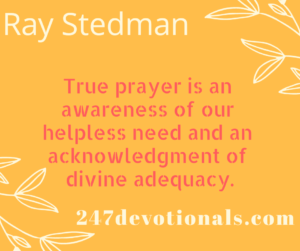Table of Contents
Topic:The situation of the earth
READ THE SCRIPTURE: GENESIS 12: 4-9
And Abram went through that land to the place of Shechem, where is the oak of More. The Canaanite then lived on earth.
Genesis 12: 6

This is more than a chronicle of what happened to Abram shortly after he arrived in that land, but it is also a very accurate picture of the conditions of a life filled with the Spirit. The first thing we are told is that Abram went through the land to the place called Siquem, to the oak of More. These names are very revealing. Shechem means “shoulder”, and in Hebrew the shoulder is a symbol of strength. We think of the slope of a mountain in the same way. The name More means “instruction”, and when we combine these two words, we have the first image of what the earth is like. Only by being taught the Word of God by the Spirit of God do we find the necessary strengths to live.
The second image we have here is that life on earth is going to be a life of constant conflict. These Canaanites were the pagan tribes that afflicted Israel throughout its history and, therefore, offer us an accurate picture of these manifestations of the evil with which we live and against which we continually struggle. These are mentioned in the New Testament in many places: greed, envy, jealousy, impatience, intemperance, irritability and susceptibility. These are our enemies, these manifestations of our being that make our existence a constant conflict.
Thirdly, it is also a life of continual cleansing, because we read below: “And he built there an altar to the Lord.” We think of an altar as a symbol of praise, which it is, but that is not the essence of its meaning. An altar is primarily a place of cleansing, which provides the basis for worship. The reason for a daily altar is the urgent need for cleanliness in the pilgrimage life. All the pilgrims need the cleansing of the blood, the cross of Christ, to which they can go judging themselves throughout their lives. Therefore, it is necessary that the life of the fullness of the Spirit be continually cleansed by the cross of Christ.
The fourth point is that this is a life of endless change. Abram erected his tent between Bethel and Ai. Bethel means “the house of God” and Hai means “ruin”. This is where we must live the Christian life, keeping our eyes constantly fixed on one of two: the things of God or the ruin of the flesh. We can decide to go to Bethel or go to Ai, go to Christ or to ourselves; We can not do both.
The store represents the last feature. He lived in a store because he was a pilgrim on earth. Throughout the entire New Testament, the Christian pilgrim is exhorted to walk in the Spirit. Walk, walk, walk! You have not reached the end of your path when you have learned the lesson of God. Tomorrow there will be another step that you will have to take, and another one the next day and another one the day after tomorrow. How the flesh suffers from this! We are always delighted when the Spirit of God takes us to the place where we get some victory, when we overcome some custom, when we take some necessary step, and then we want to settle in that place. We say to the Lord: “Follow you forward for a while and leave me here. I want to enjoy this for a while. ” But He does not allow us to stop.
Father, use these lessons from the life of Abram to guide me on my path, so that I can rise to go to the land of the fullness of blessings in Christ.
Application to life
We see that God prevents any possibility that we get bored by reading the biblical account of Abraham’s life. Do we please ourselves with the status quo or are we boldly going on adventures with God?
